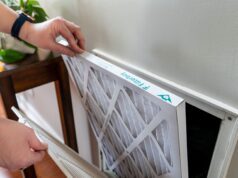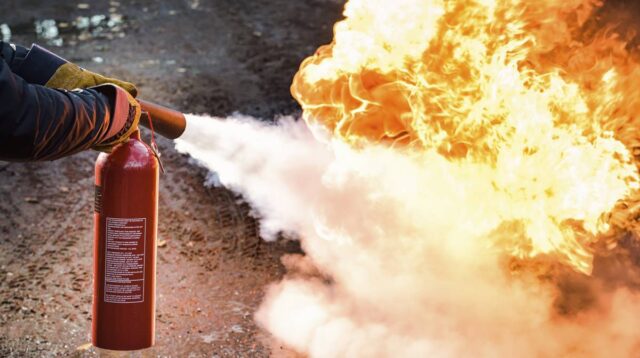
Fires can be devastating, causing property loss, injuries, and even fatalities. Taking proactive measures to prevent fires and ensuring your home is equipped with essential fire safety features is crucial for protecting your loved ones and belongings. Being prepared is your first line of defense, and here are some essential home fire safety tips to keep in mind.
1. Install Smoke Detectors
Smoke detectors are crucial to fire safety in any home. Install smoke detectors on every level of your home, including the basement and outside sleeping areas. Regularly test and replace batteries in your smoke detectors to ensure they are working properly. Consider interconnected smoke detectors that will sound the alarm throughout the entire house if one is triggered. Remember to regularly inspect your system and perform frequent tests to ensure devices are up-to-date and working properly.
2. Have Fire Extinguishers Handy
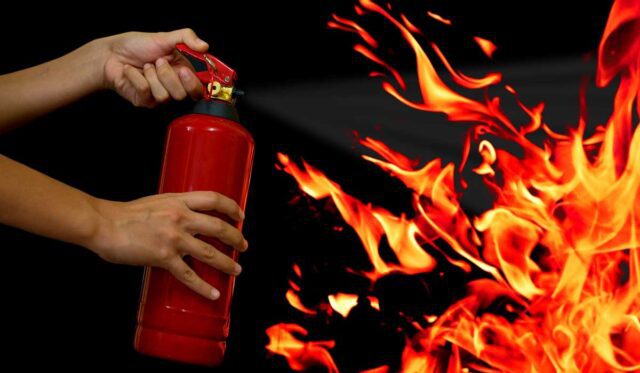
Place fire extinguishers in key locations of your home, such as the kitchen, garage, and near fireplaces. Ensure that everyone in your household knows how to use a fire extinguisher properly. Also, check the dates on your fire extinguishers, as they need to be replaced every few years. Here are some handy tips:
- Choose the Right Type of Extinguisher: Make sure you have the appropriate type of fire extinguisher for your home. Common types include ABC extinguishers, which are suitable for most fires, and specialized extinguishers for specific fire risks like grease fires or electrical fires.
- Place Extinguishers Strategically: Install fire extinguishers in key locations throughout your home. Keep one in the kitchen, near the garage, and on each level of your home, especially near bedrooms. Make sure they are easily accessible and not blocked by furniture or clutter.
- Call Emergency Services First: Remember that your safety is the top priority in a fire emergency. If a fire is spreading rapidly, it’s best to evacuate immediately and call the fire department. Use a fire extinguisher only if the fire is small and contained, and you have been trained to do so.
3. Develop an Escape Plan
Creating a well-thought-out escape plan is essential to ensure everyone’s safety in case of a fire. Involve all family members in developing and practicing the plan regularly. Identify primary and secondary escape routes from each room, establish a designated meeting point outside, and teach everyone to crawl low in case of smoke. Take the time to practice the plan at night, as this is one of the most vulnerable times for your family. Designate a specific location outside your home where everyone can gather after escaping. This ensures that everyone is accounted for and helps firefighters know that no one is left behind.
4. Practice Kitchen Safety
Kitchen fires are a common cause of household fires. Never leave the kitchen unattended while cooking, especially when using high heat or oils. Keep flammable objects away from the stovetop, such as kitchen towels and curtains. Ensure your appliances are in good working condition, and avoid overloading electrical outlets.
5. Maintain Heating Equipment
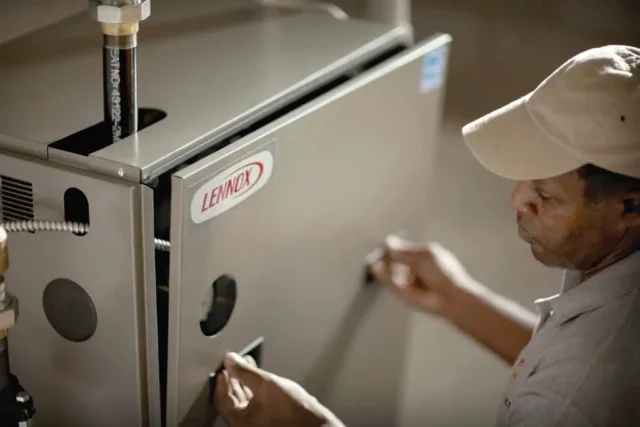
Regularly inspect and maintain heating equipment, including furnaces, fireplaces, and space heaters. Clean chimneys annually to remove flammable buildup. Keep portable heaters at least three feet away from anything that can catch fire. Never leave space heaters unattended or operating while you sleep.
6. Avoid Electrical Hazards
Electrical fires are a significant concern, with 5,300 occurring annually, according to the Electrical Safety Foundation. Inspect electrical cords for fraying or damage, and replace them if needed. Avoid overloading outlets and extension cords. Unplug appliances when not being used, and never run cords under rugs or furniture.
7. Secure Fire-Prone Areas
Pay special attention to areas prone to fire hazards. Basements can be vulnerable, so consider basement waterproofing measures to prevent electrical fires caused by water damage. Under the NFPA25 Code, fire protection systems must undergo regular inspections and functional tests to ensure they are up-to-date and working properly according to design.
8. Educate Your Family
Knowledge is power for fire safety. Teach your family members about fire hazards, prevention strategies, and how to respond in case of a fire. Ensure that children understand the importance of fire safety rules and practice caution around matches, lighters, and candles. Regularly discuss and reinforce fire safety practices with your loved ones.
9. Waterproof Your Home
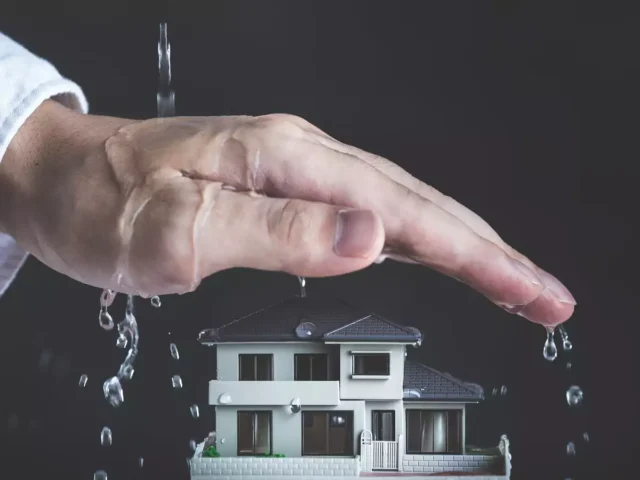
Waterproofing protects various areas of your home from water damage, which can cause a fire. Your basement is particularly susceptible to water damage, and if you keep electronics down there, such as a television, it could be a fire hazard. Consider waterproofing your basement, which will likely cost between $2,300 to $7,300 (according to Bob Vila) but will be worth every penny.
Fire prevention is a collective effort that requires everyone’s commitment and vigilance. Take the time to learn about fire safety tips and do everything you can to mitigate risks around your home. And, above all, stay safe!
10. Use Candles and Heaters with Caution
Candles:
-
- Never leave a burning candle unattended. Always extinguish candles before leaving a room or going to sleep.
- Keep candles away from flammable materials such as curtains, bedding, or decorations.
- Place candles on sturdy, heat-resistant surfaces and in proper candle holders.
- Keep candles out of the reach of children and pets.
- Trim candle wicks to a quarter-inch before lighting to prevent excessive flames and dripping wax.
- Avoid placing candles near drafts, as they can cause uneven burning or even tip the candle over.
Heaters:
-
- Maintain a safe distance between heaters and flammable objects, including furniture, curtains, and clothing.
- Place heaters on a stable, flat surface and ensure they have proper ventilation.
- Keep children and pets away from heaters to prevent accidental burns.
- Follow manufacturer’s instructions regarding the safe use and maintenance of heaters.
- Never leave heaters unattended or leave them on overnight.
- Use space heaters with built-in safety features, such as automatic shut-off switches that activate in case the heater overheats or tips over.
11. Be Mindful of Children and Pets

When it comes to home fire safety, it is crucial to be mindful of the safety of children and pets. They may not fully understand the dangers posed by fire, making it essential for adults to take extra precautions. Here are some important points to consider:
- Supervision: Always supervise children and pets, especially around open flames, heating appliances, or when cooking. Never leave them unattended in areas where fire hazards are present.
- Childproofing: Take steps to childproof your home by installing child safety gates to keep children away from areas that pose fire risks, such as the kitchen or fireplace. Keep matches, lighters, and other fire-starting materials out of their reach.
- Education: Teach children about fire safety from an early age. Teach them the dangers of fire, how to respond in case of a fire emergency, and the importance of never playing with matches or lighters.
- Fire Escape Plan: Include children in the creation and practice of your family’s fire escape plan. Teach them how to safely evacuate the home and where to meet outside. Make sure they understand that they should never hide during a fire but instead immediately exit the house.
- Pet Safety: Create a pet-friendly environment by securing loose cords and cables that pets could chew on and cause electrical hazards. Keep candles, heaters, and other fire-related objects out of their reach. Consider using flameless candles to eliminate the risk of pets knocking them over.
- Pet Identification: Ensure your pets have proper identification, such as collars with tags or microchips. In the event of a fire or emergency, this will help firefighters or rescuers locate and reunite you with your pets.
12. Consider Home Fire Sprinkler Systems
Installing a home fire sprinkler system is an effective way to enhance fire safety and protect your property and loved ones. Here are some key points to consider regarding home fire sprinkler systems:
- Fire Suppression: Home fire sprinkler systems are designed to detect and suppress fires quickly. They activate when they sense high heat or smoke, releasing water directly onto the fire. This immediate response can significantly reduce the spread of flames and the amount of damage caused by a fire.
- Life-Saving Potential: Home fire sprinkler systems provide an additional layer of protection, giving occupants more time to escape in case of a fire. They can help control the fire and create a safer environment for evacuation.
- Cost-Effective: Contrary to common belief, home fire sprinkler systems are generally affordable and cost-effective. They can potentially reduce your insurance premiums due to their effectiveness in preventing extensive property damage.
- Minimal Water Usage: Home fire sprinkler systems use significantly less water than fire department hoses, as they activate early and directly target the fire. This results in less water damage to your property during fire suppression.
- Reliable Operation: Modern home fire sprinkler systems are highly reliable and have a low chance of accidental activation. Each sprinkler head operates independently, meaning only the sprinkler closest to the fire will activate, minimizing water damage in unaffected areas.
- Maintenance and Inspections: Regular maintenance and inspections are essential to ensure the proper functioning of home fire sprinkler systems. Periodic checks by qualified professionals can help identify any issues and ensure the system is in optimal working condition.
While home fire sprinkler systems are not mandatory in most residential buildings, considering their installation can provide invaluable protection against fires. Consult with fire safety professionals to assess the suitability and requirements for your home. Remember, fire prevention measures, including sprinkler systems, can significantly increase your safety and provide peace of mind for you and your loved ones.
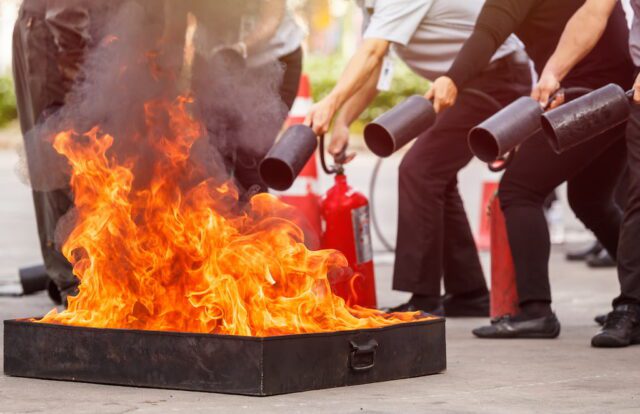
Conclusion
Home fires can be devastating, and it’s essential that we all take the necessary steps to prevent them from occurring. By following these home fire safety tips, you can keep your family safe in the event of a fire. Make sure to regularly check smoke alarms and batteries, create an escape plan and practice it with your family members, keep flammable materials away from any heat sources, and have a fire extinguisher on hand at all times. Taking these precautions now may save lives later!

